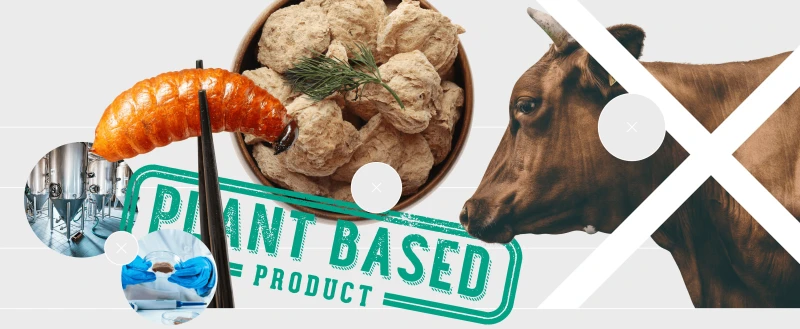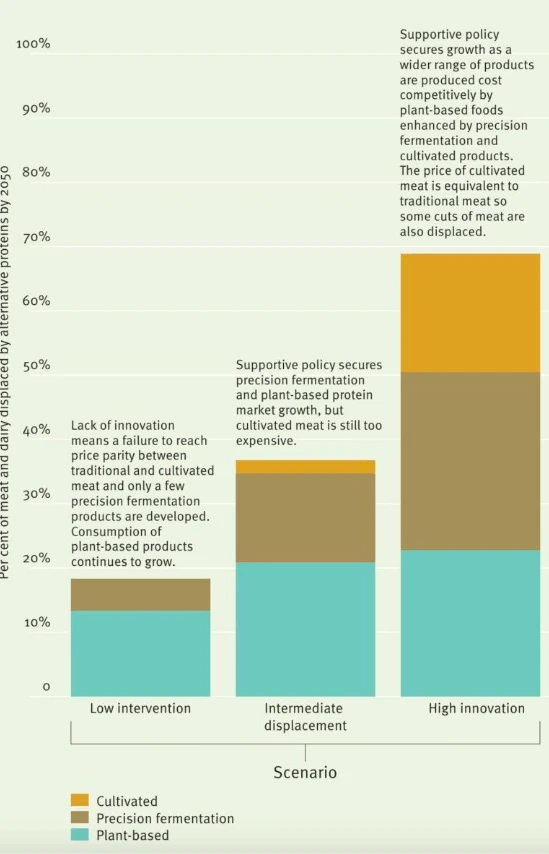Climate-adaptive alternative proteins could replace up to two-thirds of animal proteins by 2050 and dramatically reduce need for agricultural land
Climate-adaptive alternative proteins could replace up to two-thirds of animal proteins by 2050 and dramatically reduce need for agricultural land


In the least optimistic scenario, alternative proteins could displace a sixth of meat and dairy consumption in Europe. In the best-case outcome, they could replace two-thirds of animal proteins by 2050 and make the region self-sufficient.
Supportive policies for novel proteins hold the key to self-sufficiency and food security in Europe at levels last seen 30 years ago, according to a 10-country report by think tank the Green Alliance, commissioned by the Good Food Institute Europe.
Covering Denmark, France, Germany, Italy, the Netherlands, Poland, Romania, Spain, Sweden and the UK – 10 of Europe’s biggest agricultural countries – the research reveals that these nations collectively rely on twice as much foreign land for imports than the domestic land they use to produce exports. But a shift to alternative proteins, which require a fraction of the land needed for meat and dairy production, could enable nearly all of these countries to eliminate their reliance on imports to feed their citizens.
The extent of displacement relies on three factors: price parity (which will speed up if inflation keeps disproportionately affecting animal proteins), policy (in terms of government funding, infrastructure and regulatory support), and taste (the report argues precision-fermented and cultivated proteins need to be successful to replace cuts of meats and cheese that plant-based products may not).

This is an excerpt. Read the original post here

 | Videos | More... |

Video: Nuclear energy will destroy us? Global warming is an existential threat? Chemicals are massacring bees? Donate to the Green Industrial Complex!
 | Bees & Pollinators | More... |

GLP podcast: Science journalism is a mess. Here’s how to fix it

Mosquito massacre: Can we safely tackle malaria with a CRISPR gene drive?

Are we facing an ‘Insect Apocalypse’ caused by ‘intensive, industrial’ farming and agricultural chemicals? The media say yes; Science says ‘no’
 | Infographics | More... |

Infographic: Global regulatory and health research agencies on whether glyphosate causes cancer
 | GMO FAQs | More... |

Why is there controversy over GMO foods but not GMO drugs?

How are GMOs labeled around the world?

How does genetic engineering differ from conventional breeding?
 | GLP Profiles | More... |

Alex Jones: Right-wing conspiracy theorist stokes fear of GMOs, pesticides to sell ‘health supplements’




 Viewpoint — Fact checking MAHA mythmakers: How wellness influencers and RFK, Jr. undermine American science and health
Viewpoint — Fact checking MAHA mythmakers: How wellness influencers and RFK, Jr. undermine American science and health Viewpoint: Video — Big Solar is gobbling up productive agricultural land and hurting farmers yet providing little energy or sustainabilty gains
Viewpoint: Video — Big Solar is gobbling up productive agricultural land and hurting farmers yet providing little energy or sustainabilty gains Fighting deforestation with CO2: Biotechnology breakthrough creates sustainable palm oil alternative for cosmetics
Fighting deforestation with CO2: Biotechnology breakthrough creates sustainable palm oil alternative for cosmetics Trust issues: What happens when therapists use ChatGPT?
Trust issues: What happens when therapists use ChatGPT? 30-year-old tomato line shows genetic resistance to devastating virus
30-year-old tomato line shows genetic resistance to devastating virus California, Washington, Oregon forge immunization alliance to safeguard vaccine access against federal undermining
California, Washington, Oregon forge immunization alliance to safeguard vaccine access against federal undermining The free-range chicken dilemma: Better for birds, but with substantial costs
The free-range chicken dilemma: Better for birds, but with substantial costs ‘You have to treat the brain first’: Rethinking chronic pain with Sanjay Gupta
‘You have to treat the brain first’: Rethinking chronic pain with Sanjay Gupta
